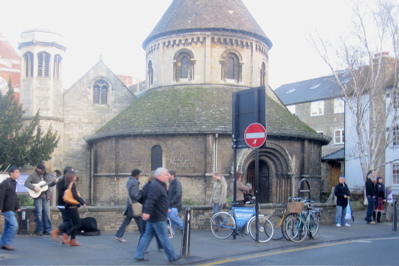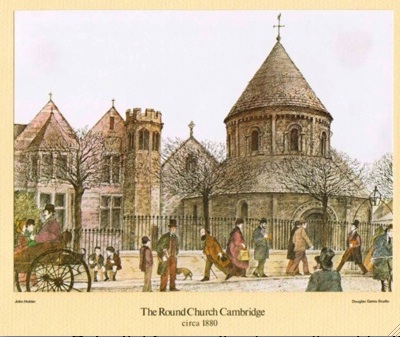
At Cambridge City Council’s West-Central Area Committee on the 10th of December 2009 councillors rejected a proposal to contribute public funds to the reinstatement of the railings around the Round Church in central Cambridge.
Councillors had rejected the idea at previous meetings and expressed annoyance at being asked to consider it again. Council officers were recommending the project be approved and a sum of £7,800 (50% part-funding) for the project had been listed as “approved” in the meeting’s papers.
The main reason councillors gave for their not spending the money was that the problems which it had been said the railings were intended to tackle, of drunks using the area an leaving excrement in and around the site, ought be tackled by the police rather than by putting up railings.
Councillors said they would hope to solve the “ASB” issue through the police priority which they had set earlier in the meeting.
I think the councillors made the right decision to not spend public money on this project, and to ask the police to deal with the problems.
Cambridge Blue Badge Guide Allan Brigham used the open forum section of the meeting to speak against the installation of the railings. He said they would create a barrier. Mr Brigham said he had written a book on cast iron railings so was a fan of them in general; but said the answer was not to close down areas in response to issues.

Cllr Hipkin was the only councillor to support the railings. He said that he didn’t accept Allan Brigham’s argument on the grounds that: “some of the most pleasant spots in Cambridge have railings round them”, Cllr Hipkin didn’t give an example.
Also during the open forum, Martin Lown spoke on behalf Christian Heritage, the tenants of the Round Church. He said there were problems with excrement and urine during the day and night on the site. He said the proposals were for railings which would not be overly tall or heavy. He said the aim was to make the site more secure and said the gates would be open from dawn to dusk. He said the proposals would blend in with the churches and colleges in the city centre. He told the meeting his proposals had the support of the Cafe opposite, the Cambridge Union and the Police.
Cllr Knightly contributed to the debate from a different angle, saying : “The low wall to sit on would be a sad loss”
The round church is owned by the St Andrew the Great Church.
This was only an application for the money; if the church decides to go ahead with the project with other funding then the matter will presumably return to the West/Central Area committee as a planning application. However councillors have now on two occasions made their opposition to the installation of railings clear.
The church, which now houses an exhibition and film, offers free entry to Cambridge Residents.
5 responses to “Police Not Railings To Tackle Round Church Problems”
Could part of the solution be to make the whole of Cambridge an area in which it is illegal to drink alcohol out of doors? I know it’s not desirable in civil rights terms, but in my home-town of Glasgow it made a real difference to anti-social behaviour levels.
What a terrible idea. It would criminalise everyone having a picnic with alcohol.
The solution is for police to use existing powers when people are creating an actual problem, not to have more stupid and illiberal measures with obvious side-effects.
A Designated Public Places Order (DPPO) to ban drinking alcohol in public is something Cambridge City Council is regularly asked to consider by residents.
In previous election campaigns the Labour party has strongly proposed such an order being put in place, with ex. Labour MP Anne Campbell organising a petition for one*. The Liberal Democrat City Council, who have to agree to such an order, have resisted it both on the grounds Martin describes – criminalising people drinking responsibly – and on a technicality that it is currently impossible to get a license to sell alcohol on public spaces covered by a DPPO; this would cause problems with events on the city’s green spaces. The City Council were lobbying for a change in the law to allow both DPPOs and alcohol licenses on the city’s green spaces. *
Instead of a DPPO the City Council have opted for “Dispersal Zones”; a scheme brought in by the 2003 Anti-Social Behavior Act; these give draconian powers to the most junior members of the police – PCSOs – who can order two people to split up and leave the area of the zone. In Cambridge large swathes of the city are covered by such zones. It is almost impossible to find out exactly what areas are covered as neither the police or council publish details online; not all extensions and renewals are decided upon in public meetings.
I am not in favour of giving the police powers which crimalise normal and reasonable behavior. Like Martin I think the police have existing powers which can be used to tackle those who are actually causing problems.
I think both DPPOs and “Dispersal Zones” are oppressive measures which give the police too much power over innocent people. At the recent Jesus Green Association meeting the possibility of a Dispersal Order being used to disperse Lacrosse teams practicing on the green was jokingly raised; but the reality is that a PCSO could use these powers on anyone. These powers do not just affect those behaving in an anti-social and criminal manner they affect everyone in the city.
I am concerned that the public relationship with the police would be further damaged if the police were given excessive powers which some of the city’s PCSOs are lobbying to be given.
In the case of “Dispersal Zones” they don’t work because there is insufficient publicity; and magistrates don’t sentence people for breaching them on the grounds that the list of streets given to those being dispersed is so long that people can’t be expected to work out which area they are being banned from entering.
At the recent West/Central area committee I asked about the renewal of the City’s Dispersal Zones and recieved an asurance from Cllr Cantrill dispersal zones for the city are to be considered in public at the January 2010 Strategy and Resources meeting of the City Council.
See also : http://www.rtaylor.co.uk/tag/dispersal-zones
It’s unacceptable to have a situation where the police have draconian powers but are free to choose whether or not to enforce them.
Is it really fair for the authorities to turn a blind eye to the middle class family enjoying a glass of wine with their picnic in the park, but target groups of young adults drinking cans of cheap lager?
Last week in the Cambridge News there was a story about an 84 year old great-grandmother who was asked to remove her hood by a security guard in the Grand Arcade.
The shopping centre later apologised and said it was reviewing its policy.
I found myself wondering why, if it is unacceptable to ask an 84 year old to remove her hood, that it is ok to ask a younger person to do the same.
As with dispersal and anti-drinking powers, where is the cut-off point and, more importantly who decides?
Ah – I didn’t realise alcohol couldn’t be sold in a DPPO area. This isn’t the case in the Glasgow ban, but different laws may be in place.